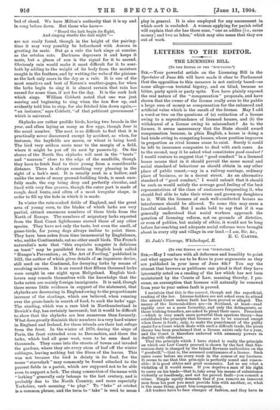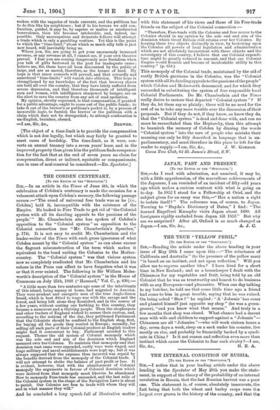SIR, — May I venture with all deference and humility to point
out what appear to me to be flaws in your arguments as they are published in your issue of June 4th ? You say the utmost that brewers or publicans can plead is that they have ignorantly acted on a reading of the law which has not been maintained by the Courts of Law, meaning thereby, I pre- sume, an assumption that licenses will naturally be renewed
from year to year unless fault is proved.
I maintain that this is the correct, though not the superficial, reading of the law. License-holders are not asked even to attend the annual Court unless fault has been proved or alleged. The names of the licensetholders are—in Scotland, at least—read rapidly over as a mere formality, and only the delinquents, or those wishing transfers, are asked to plead their cases. Precedent —which is very much more powerful than specious theory—has established the principle that licenses are to be renewed except when there is fault; only, to make the punishment of the guilty easier for a Court which deals with such a difficult trade, the pious theory has been proclaimed that a license exists only for a year, and the Court is therefore endowed with summary powers in dealing with offenders.
That the principle which I have stated is really the principle on which our Law Courts proceed is shown by the fact that Suc- cession-duty is charged by the Inland Revenue authorities on the "goodwill,"—that is, the assumed continuance of a license. Such cases come before me every week in the course of my business. It seems to me that this principle is perfectly sound and reason- able: it is good ethics and good economics. Let us see what a violation of it would mean. If you deprive a man of his right to carry on his trade—that is, take away his means of subsistence violently or heedlessly, and not for proved fault—you commit a crime. Simple equity demands that if you remove an innocent man from his post you must provide him with another, or, what is the same thing, grant him compensation.
. All traders have t a face changes of fashion, and they have to reckon with the vagaries of trade currents, and the publican has to do this like his neighbours ; but if to his terrors we add con- fiscation, guided, it may be, by caprice or malice or misdirected benevolence, then life becomes intolerable, and, indeed, im- possible. Only unscrupulous and desperate fellows will attempt a trade which is only a gambling venture. Yet this is the point to which the "time-limit," about which so much silly talk is just now heard, will inevitably bring us.
Where you, Sir, are going to get your enormously increased revenue, or any revenue at all, I cannot see, if your own theories prevail. I fear you are coming dangerously near Socialism when you talk of gifts bestowed in the past for inadequate cause; believe me, Sir, these have all been discounted by the public at large, and are as sacred, therefore, as the tenure of land. My hope is that saner counsels will prevail, and that cowardly and anarchical "time-limits" will vanish into oblivion. This hope is strengthened by my knowledge of the fact that brewery shares are held all over the country, that they have lately suffered from severe depression, and that therefore thousands of intelligent men and women, with intelligence sharpened by hunger, are on the alert to save the country from any act of mad spoliation.
My opinion, shortly expressed, is that compensation, if granted for a public advantage, ought to come out of the public funds ; to take it out of the brewer's or publican's pocket is, by a process of inexorable logic, to furnish the brewer or the publican with a claim which dare not be disregarded; to attempt confiscation is un-English, brainless, absurd.
—I am, Sir, &c., BREWER.
[The object of a time-limit is to provide the compensation which is not due legally, but which may fairly be granted to meet cases of hardship. The time-limit, as it were, con- verts an annual tenancy into a seven years' lease, and in the improved property thus given him the publican finds compensa- tion for the fact that at the end of seven years no claim for compensation, direct or indirect, equitable or compassionate,
can in case of non-renewal be considered.—ED. Spectator.]











































 Previous page
Previous page